|
|
|
Sort Order |
|
|
|
Items / Page
|
|
|
|
|
|
|
| Srl | Item |
| 1 |
ID:
158166
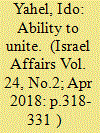

|
|
|
|
|
| Summary/Abstract |
This article compares and contrasts the relations among the three Jewish underground groups in Mandatory Palestine ‒ the Hagana, the Irgun and LEHI ‒ with three anti-colonial national liberation movements: in Malaya, Algeria and Vietnam. It shows that the fact that the Jewish resistance movement had the fewest divisive elements enabled it to unite its three distinct components, however briefly (in 1945–1946), though the reappearance of the divisive factors led to the dismantlement of the united front and to each organisation conducting its own struggle for national liberation.
|
|
|
|
|
|
|
|
|
|
|
|
|
|
|
|
| 2 |
ID:
158164
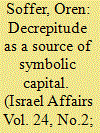

|
|
|
|
|
| Summary/Abstract |
The Israel Defence Forces radio station has been broadcasting to the general public for 68 years, becoming increasingly popular over the last few decades. Following the work of Nick Couldry, this article explores the cultural importance of the station’s production site. It argues that the Israeli army radio station is a special case in that the physical drabness of the media site legitimises its military provenance, strengthening a direct link between the media organisation and its staff, as well as between the army as a whole and the Israeli general public.
|
|
|
|
|
|
|
|
|
|
|
|
|
|
|
|
| 3 |
ID:
158163
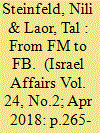

|
|
|
|
|
| Summary/Abstract |
The article explores Israeli radio stations’ activity on Facebook and analyses the most popular content in terms of various engagement indexes. It finds that the format of a post, its language and content, all affect the level and nature of user engagement with the post. Moreover, it appears that both stations and users turn to Facebook primarily for promotional and PR purposes and less so for promoting mutual interaction and dialogue between stations and their audiences, thus complementing the traditional medium without utilising the full range of opportunities this new platform has to offer radio.
|
|
|
|
|
|
|
|
|
|
|
|
|
|
|
|
| 4 |
ID:
158161
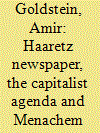

|
|
|
|
|
| Summary/Abstract |
During the 1960s, the Haaretz newspaper was a staunch supporter of the key political decisions made by Menachem Begin, thus playing a significant role in reinforcing his legitimacy and that of his Herut movement. On the one hand, this support was motivated by the desire to transform Israel’s socialist economy into a freer and less government-controlled market. On the other hand, it stemmed from the aspiration to democratise Israel’s political life. This symbiosis began to emerge in the early 1960s and was sustained over a lengthy period of time, thus underscoring the role played by Israeli bourgeois-liberal circles in the Zionist Right’s path to power.
|
|
|
|
|
|
|
|
|
|
|
|
|
|
|
|
| 5 |
ID:
158158
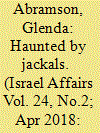

|
|
|
|
|
| Summary/Abstract |
In 1917, towards the end of the First World War, the Ottoman Governor of the Levant, Jamal Pasha, ordered the expulsion of the communities of Jaffa and Tel Aviv, ostensibly for their safety. Moving northwards to the Lower Galilee, the Jewish deportees’ actual experiences were severe and traumatic, with many instances of great suffering, illness and death. A series of other, smaller, but no less deadly, expulsions began in the winter of 1917 following the NILI affair. In November 1917, several groups, mainly of Jews, primarily those suspected of an association with NILI, were imprisoned in Jerusalem, then moved to prisons in Damascus on foot or by train. The deportees included the Arab educationist Khalil Sakakini, and two Jews who later became prominent in the Zionist movement, N. Twersky and Yitzhak Livni. After an introduction describing the expulsion from Jaffa, this article describes the forced marches and imprisonment endured by Twersky, Sakakini, and Livni, based on their diaries.
|
|
|
|
|
|
|
|
|
|
|
|
|
|
|
|
| 6 |
ID:
158162


|
|
|
|
|
| Summary/Abstract |
This article seeks to determine the effect of the amount of public debt on the long-run economic growth of the Israeli economy, using data from the years 1983–2013. The accepted economic perspective is that the influence of public debt on the economy depends on the ratio of the size of the debt to GDP. This article will also measure the influence of the size of public debt in accordance with this ratio, with the implication being that the larger the debt, the larger the ratio of debt to GDP. It will indicate that the relationship between the ratio of public debt to GDP and economic growth appears graphically as an inverted U shape. Such a relationship implies that for relatively low levels of debt to GDP ratio there is a positive effect on growth and only at higher levels of this ratio does the marginal effect become negative. The article was not able to locate the exact inflection point at which the influence becomes negative, but it can be determined that this point lies within the range of a debt to GDP ratio of 130% and greater. These results are contrary to other results which have shown that the negative influence begins at a ratio of 90%.
|
|
|
|
|
|
|
|
|
|
|
|
|
|
|
|
| 7 |
ID:
158165


|
|
|
|
|
| Summary/Abstract |
The crossover of journalists to politics is not a novel phenomenon, but in Israel it has intensified in recent years with the increase in the number and the name recognition of the journalists who make the transition. Why do journalists make the transition to politics? Do they make an effective use of their media skills, and how do they perform as parliamentarians? To address these questions, semi-structured interviews were conducted with parliamentary reporters ‒ the main link between parliamentary affairs and the media.
|
|
|
|
|
|
|
|
|
|
|
|
|
|
|
|
| 8 |
ID:
158159


|
|
|
|
|
| Summary/Abstract |
Mandatory Palestine’s military landscape was shaped during World War II in accordance with British imperial interests. After the 1948 Arab‒Israeli war, military spatial patterns and landscapes were transformed to conform to Israel’s national interests and needs. This article deals with the transformation of the British military spatial heritage following the takeover of former British bases by the Israeli armed forces and civil institutions and its impact on the organisation and building of both the Israeli military system and the spatial, social and cultural structures of the evolving Israeli society during the 1950s.
|
|
|
|
|
|
|
|
|
|
|
|
|
|
|
|
| 9 |
ID:
158167


|
|
|
|
|
| Summary/Abstract |
This article examines the impact of three moderating variables ‒ attachment style, family support, and general values ‒ on the wellbeing of Israeli adolescents exposed to various levels of ongoing security threats. Based on a sample of 412 adolescents, it shows that young persons with a secure attachment style, high family support, and formed values have a higher degree of wellbeing. The findings for twelfth graders are of particular concern as their wellbeing was found to be lower than that of ninth and tenth graders. Using the path analysis model, the article explores the practical implications of the results and suggests ways and means for treating adolescents in similar circumstances.
|
|
|
|
|
|
|
|
|
|
|
|
|
|
|
|
|
|
|
|
|